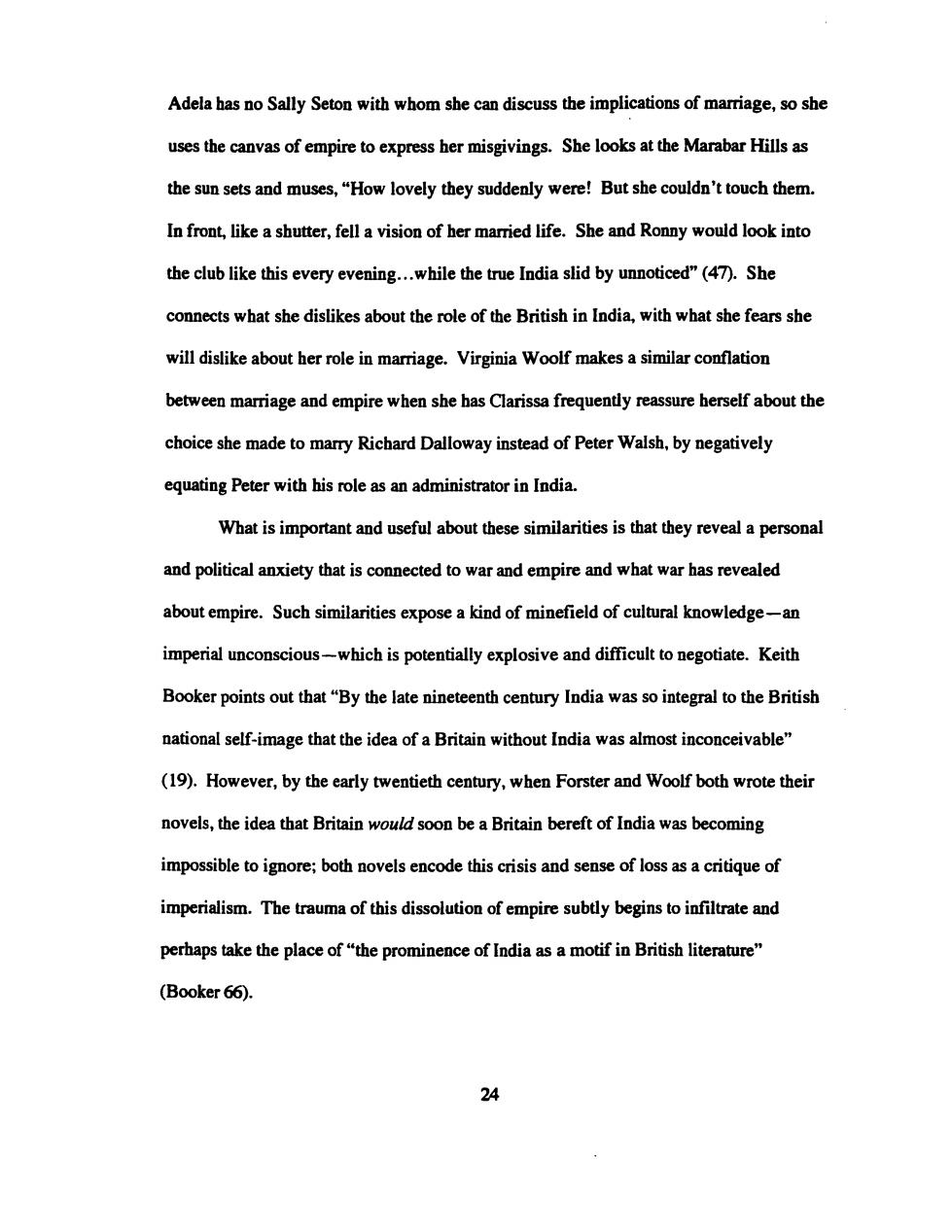
Adela has no Sally Seton with whom she can discuss the implications of marriage,so she uses the canvas of empire to express her misgivings.She looks at the Marabar Hills as the sun sets and muses,"How lovely they suddenly were!But she couldn't touch them. In front,like a shutter,fell a vision of her married life.She and Ronny would look into the club like this every evening...while the true India slid by unnoticed"(47).She connects what she dislikes about the role of the British in India,with what she fears she will dislike about her role in marriage.Virginia Woolf makes a similar conflation between marriage and empire when she has Clarissa frequently reassure herself about the choice she made to marry Richard Dalloway instead of Peter Walsh,by negatively equating Peter with his role as an administrator in India What is important and useful about these similarities is that they reveal a personal and political anxiety that is connected to war and empire and what war has revealed about empire.Such similarities expose a kind of minefield of cultural knowledge-an imperial unconscious-which is potentially explosive and difficult to negotiate.Keith Booker points out that"By the late nineteenth century India was so integral to the British national self-image that the idea of a Britain without India was almost inconceivable" (19).However,by the early twentieth century,when Forster and Woolf both wrote their novels,the idea that Britain would soon be a Britain bereft of India was becoming impossible to ignore;both novels encode this crisis and sense of loss as a critique of imperialism.The trauma of this dissolution of empire subtly begins to infiltrate and perhaps take the place of "the prominence of India as a motif in British literature" (Booker 66). 24
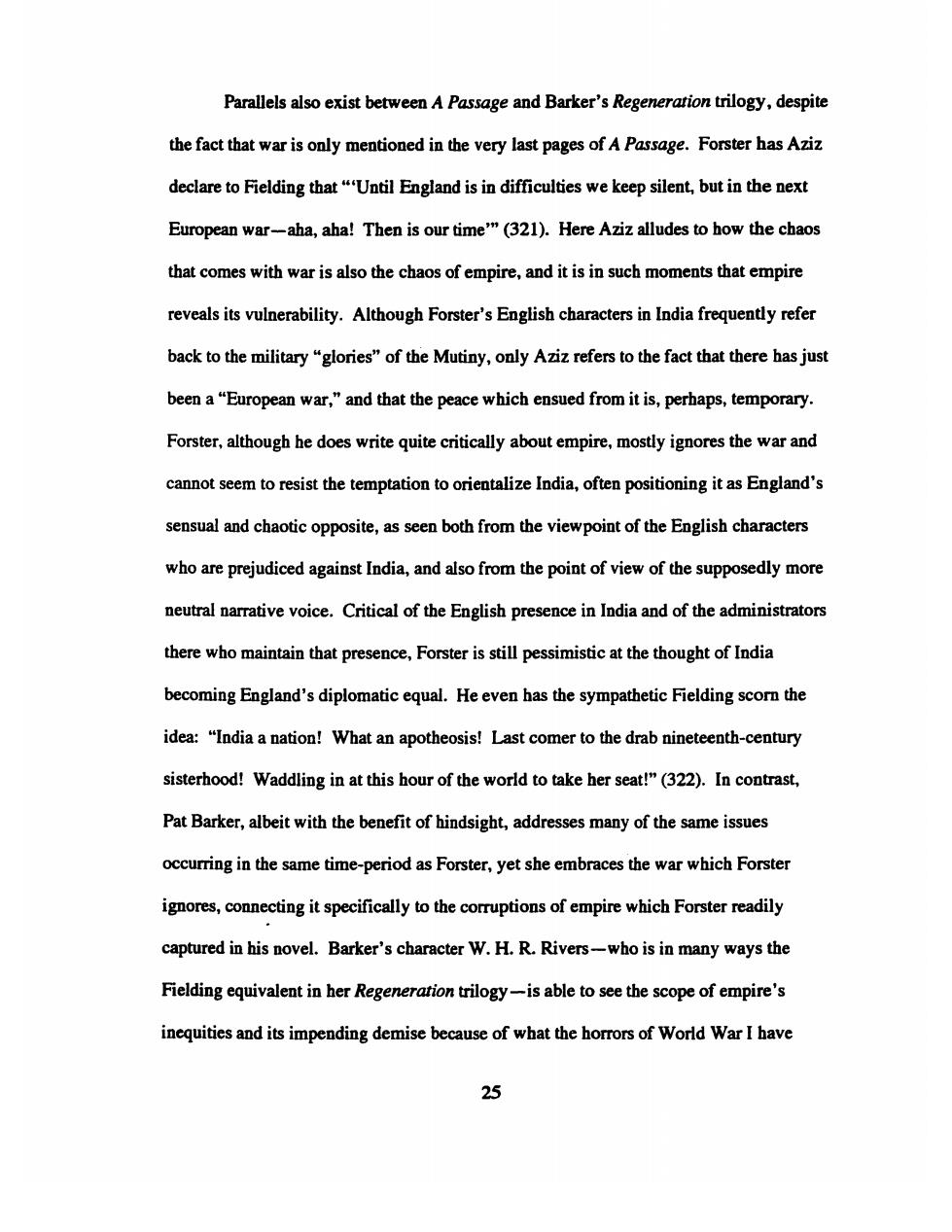
Parallels also exist between A Passage and Barker's Regeneration trilogy,despite the fact that war is only mentioned in the very last pages of A Passage.Forster has Aziz declare to Fielding that"'Until England is in difficulties we keep silent,but in the next European war-aha,aha!Then is our time'"(321).Here Aziz alludes to how the chaos that comes with war is also the chaos of empire,and it is in such moments that empire reveals its vulnerability.Although Forster's English characters in India frequently refer back to the military "glories"of the Mutiny,only Aziz refers to the fact that there has just been a"European war,"and that the peace which ensued from it is,perhaps,temporary. Forster,although he does write quite critically about empire,mostly ignores the war and cannot seem to resist the temptation to orientalize India,often positioning it as England's sensual and chaotic opposite,as seen both from the viewpoint of the English characters who are prejudiced against India,and also from the point of view of the supposedly more neutral narrative voice.Critical of the English presence in India and of the administrators there who maintain that presence,Forster is still pessimistic at the thought of India becoming England's diplomatic equal.He even has the sympathetic Fielding scorn the idea:"India a nation!What an apotheosis!Last comer to the drab nineteenth-century sisterhood!Waddling in at this hour of the world to take her seat!"(322).In contrast, Pat Barker,albeit with the benefit of hindsight,addresses many of the same issues occurring in the same time-period as Forster,yet she embraces the war which Forster ignores,connecting it specifically to the corruptions of empire which Forster readily captured in his novel.Barker's character W.H.R.Rivers-who is in many ways the Fielding equivalent in her Regeneration trilogy-is able to see the scope of empire's inequities and its impending demise because of what the horrors of World War I have 25
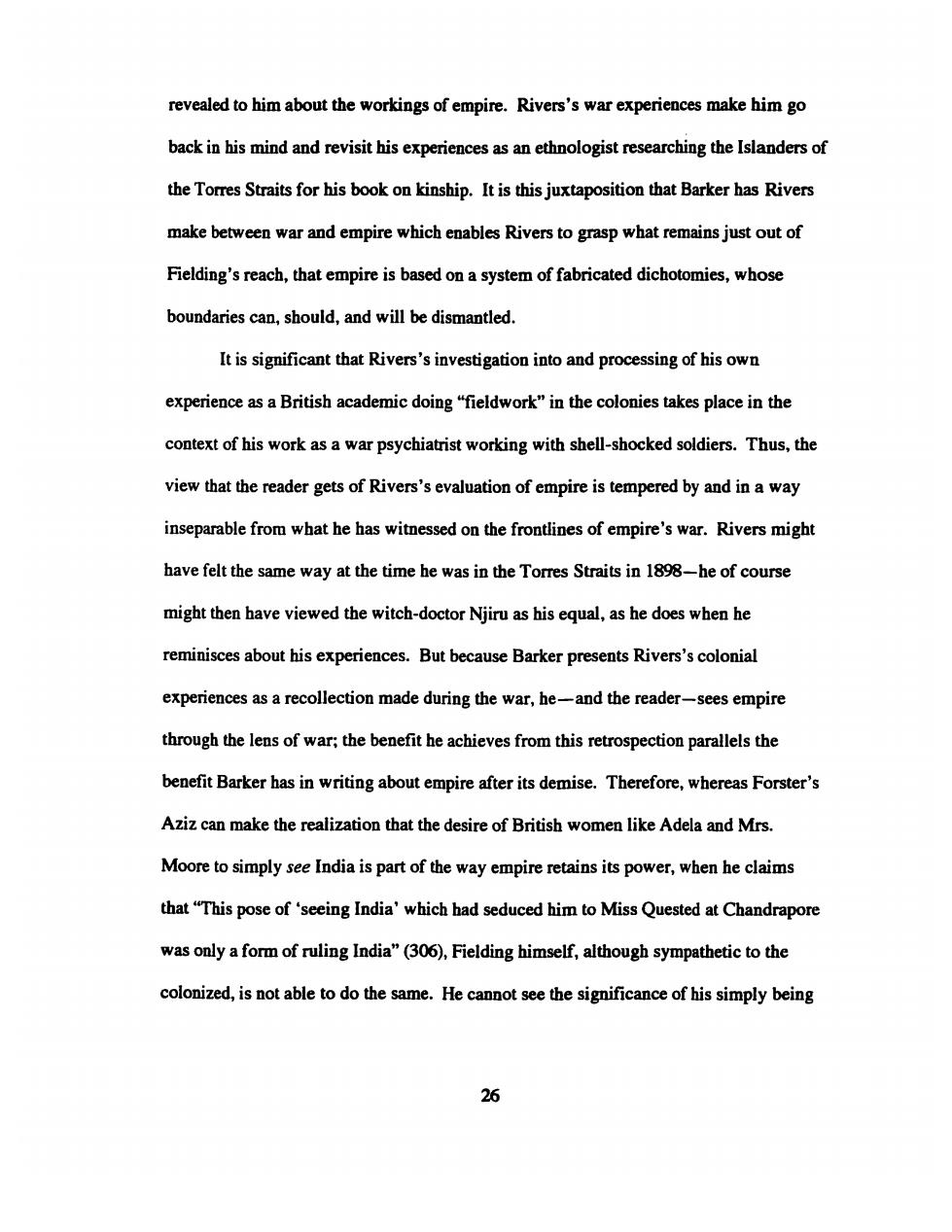
revealed to him about the workings of empire.Rivers's war experiences make him go back in his mind and revisit his experiences as an ethnologist researching the Islanders of the Torres Straits for his book on kinship.It is this juxtaposition that Barker has Rivers make between war and empire which enables Rivers to grasp what remains just out of Fielding's reach,that empire is based on a system of fabricated dichotomies,whose boundaries can,should,and will be dismantled. It is significant that Rivers's investigation into and processing of his own experience as a British academic doing"fieldwork"in the colonies takes place in the context of his work as a war psychiatrist working with shell-shocked soldiers.Thus,the view that the reader gets of Rivers's evaluation of empire is tempered by and in a way inseparable from what he has witnessed on the frontlines of empire's war.Rivers might have felt the same way at the time he was in the Torres Straits in 1898-he of course might then have viewed the witch-doctor Njiru as his equal,as he does when he reminisces about his experiences.But because Barker presents Rivers's colonial experiences as a recollection made during the war,he-and the reader-sees empire through the lens of war;the benefit he achieves from this retrospection parallels the benefit Barker has in writing about empire after its demise.Therefore,whereas Forster's Aziz can make the realization that the desire of British women like Adela and Mrs. Moore to simply see India is part of the way empire retains its power,when he claims that"This pose of 'seeing India'which had seduced him to Miss Quested at Chandrapore was only a form of ruling India"(306),Fielding himself,although sympathetic to the colonized,is not able to do the same.He cannot see the significance of his simply being 26
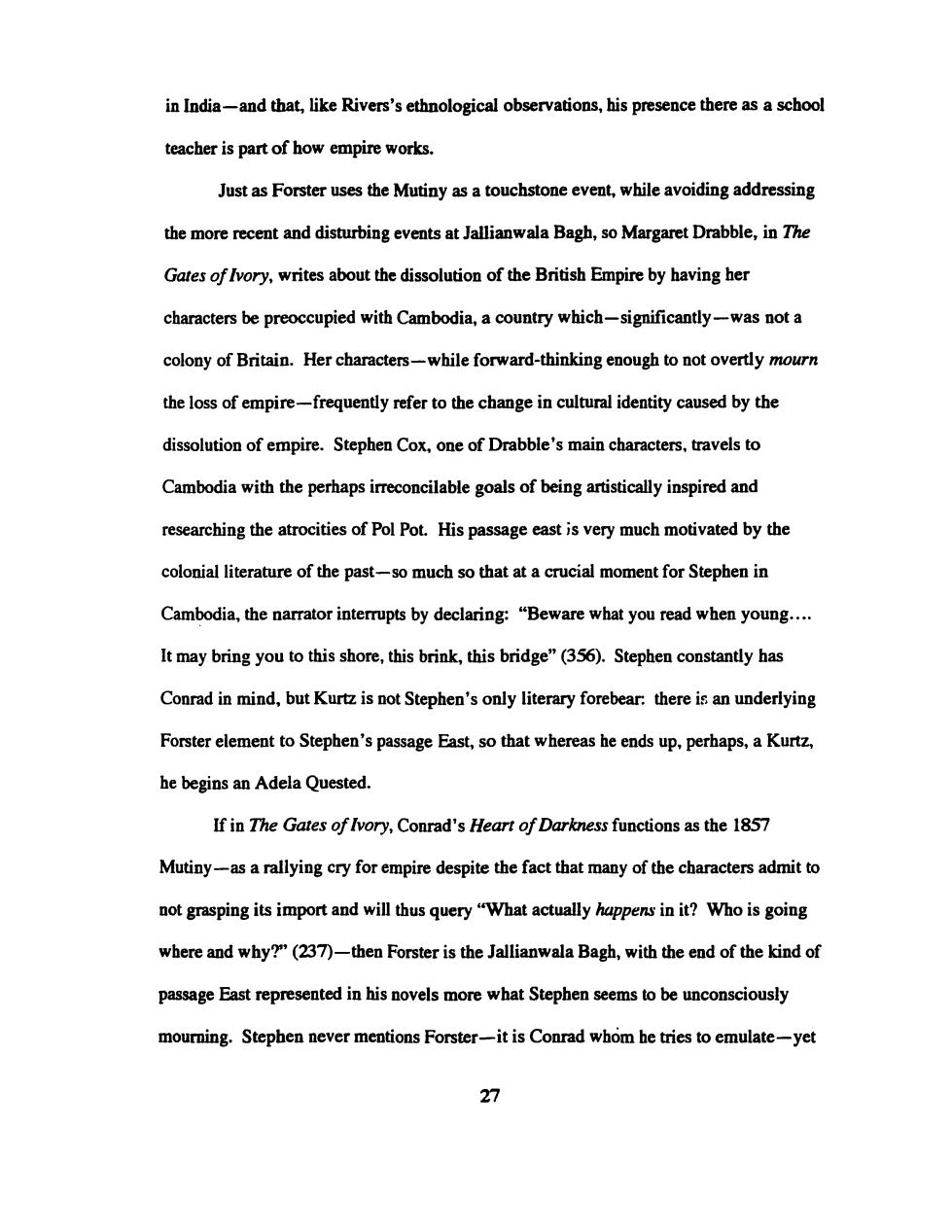
in India-and that,like Rivers's ethnological observations,his presence there as a school teacher is part of how empire works. Just as Forster uses the Mutiny as a touchstone event,while avoiding addressing the more recent and disturbing events at Jallianwala Bagh,so Margaret Drabble,in The Gates of Ivory,writes about the dissolution of the British Empire by having her characters be preoccupied with Cambodia,a country which-significantly-was not a colony of Britain.Her characters-while forward-thinking enough to not overtly mourn the loss of empire-frequently refer to the change in cultural identity caused by the dissolution of empire.Stephen Cox,one of Drabble's main characters,travels to Cambodia with the perhaps irreconcilable goals of being artistically inspired and researching the atrocities of Pol Pot.His passage east is very much motivated by the colonial literature of the past-so much so that at a crucial moment for Stephen in Cambodia,the narrator interrupts by declaring:"Beware what you read when young.... It may bring you to this shore,this brink,this bridge"(356).Stephen constantly has Conrad in mind,but Kurtz is not Stephen's only literary forebear:there is an underlying Forster element to Stephen's passage East,so that whereas he ends up,perhaps,a Kurtz, he begins an Adela Quested. If in The Gates of Ivory,Conrad's Heart of Darkness functions as the 1857 Mutiny-as a rallying cry for empire despite the fact that many of the characters admit to not grasping its import and will thus query"What actually happens in it?Who is going where and why?"(237)-then Forster is the Jallianwala Bagh,with the end of the kind of passage East represented in his novels more what Stephen seems to be unconsciously mourning.Stephen never mentions Forster-it is Conrad whom he tries to emulate-yet 27
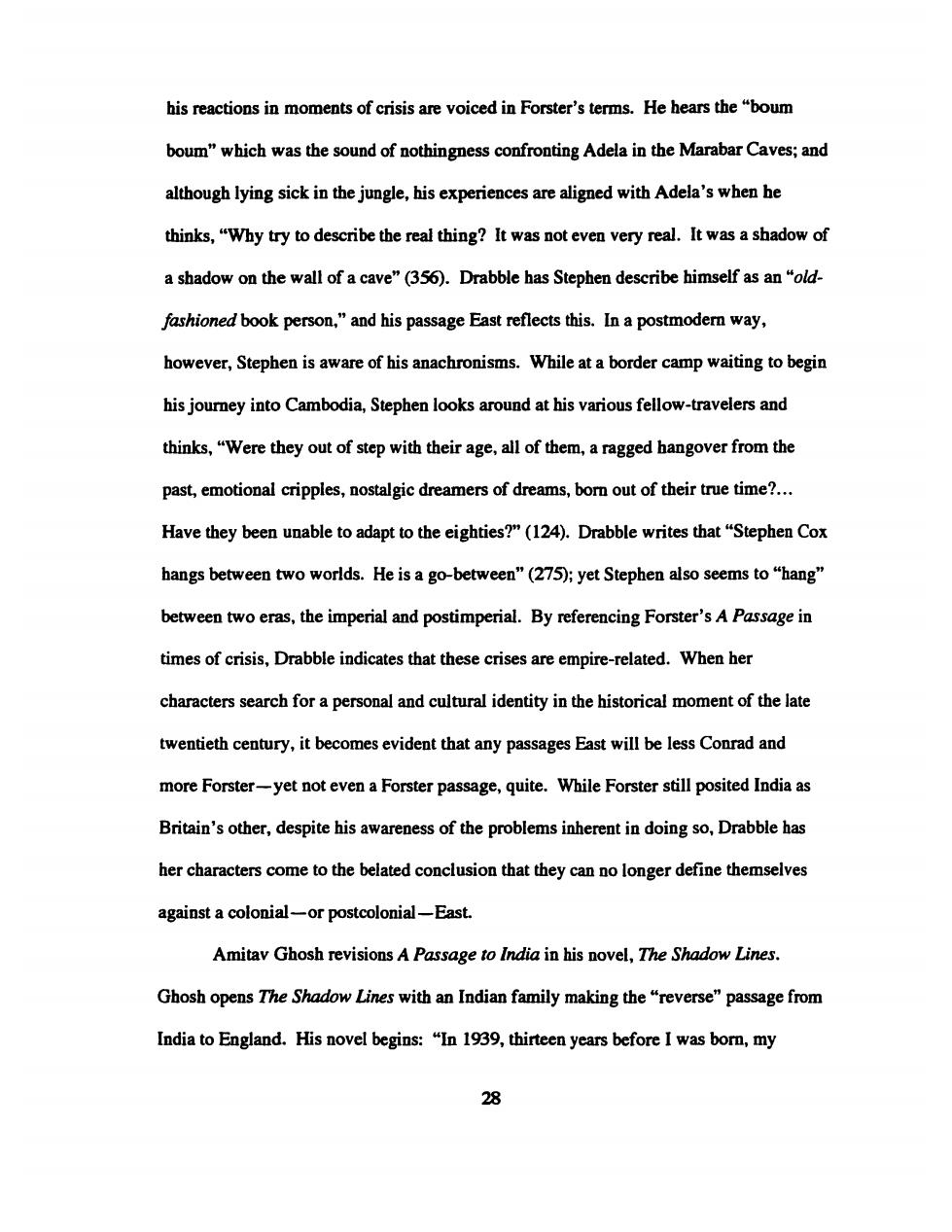
his reactions in moments of crisis are voiced in Forster's terms.He hears the "boum boum"which was the sound of nothingness confronting Adela in the Marabar Caves;and although lying sick in the jungle,his experiences are aligned with Adela's when he thinks,"Why try to describe the real thing?It was not even very real.It was a shadow of a shadow on the wall of a cave"(356).Drabble has Stephen describe himself as an "old- fashioned book person,"and his passage East reflects this.In a postmodern way, however,Stephen is aware of his anachronisms.While at a border camp waiting to begin his journey into Cambodia,Stephen looks around at his various fellow-travelers and thinks,"Were they out of step with their age,all of them,a ragged hangover from the past,emotional cripples,nostalgic dreamers of dreams,born out of their true time?... Have they been unable to adapt to the eighties?"(124).Drabble writes that"Stephen Cox hangs between two worlds.He is a go-between"(275);yet Stephen also seems to"hang" between two eras,the imperial and postimperial.By referencing Forster's A Passage in times of crisis,Drabble indicates that these crises are empire-related.When her characters search for a personal and cultural identity in the historical moment of the late twentieth century,it becomes evident that any passages East will be less Conrad and more Forster-yet not even a Forster passage,quite.While Forster still posited India as Britain's other,despite his awareness of the problems inherent in doing so,Drabble has her characters come to the belated conclusion that they can no longer define themselves against a colonial-or postcolonial-East. Amitav Ghosh revisions A Passage to India in his novel,The Shadow Lines. Ghosh opens The Shadow Lines with an Indian family making the"reverse"passage from India to England.His novel begins:"In 1939,thirteen years before I was born,my 28